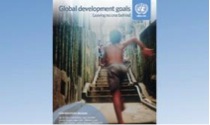Feb. 14, 2014 – Andrea Titus
“Wanted: A New Data Revolution.” Such was the call issued by the United Nations High Level Panel on the Post-2015 Development Agenda last year, no doubt in response to the two defining features of the current data landscape in development policy. The first is the dubious accuracy of national and official statistics that currently serve as the foundation of evidence for decisionmaking. The second is the rapid rise of technologies, social media, and crowdsourcing capabilities that have the potential to unlock new sources of data that are, at least on face, appealingly transparent and participatory.
When the Millennium Development Goals (MDGs) were established at the start of the century, they placed a new focus on the importance of measurable development indicators on a global scale. From the start, however, there have been serious concerns about the quality of the data we use to assess progress towards the MDGs, much of which relies on infrequent censuses and extrapolation, filtered through national governments. As the World Bank notes just alongside its interactive data portal, “the quality of global data depends on how well these national systems perform,” and performance is uneven at best.
Enter “big data,” and the potential for new and nontraditional sources of information to transform the development landscape. Already, researchers are using mobile phone records to track the spread of malaria, or Twitter posts to detect epidemics. The use of big data is still at its infancy, but it shows so much promise that the development community responded enthusiastically to the UN High Level Panel’s call for a revolution with its own set of colorful military analogies. “As Napolean is alleged to have said, “[W]ar is 90 percent information,”” wrote Claire Melamed of the Overseas Development Institute (ODI), “and that applies to the war on poverty as much as to any military conflict.”
Like any other revolution, however, the “data revolution” is characterized by a number of sticky questions about governance. While some see big data as a means to increase transparency and accountability, and therefore as a means to check traditional power structures, others are worried that existing power dynamics will simply map onto a new scene. There are also questions about how to effectively engage private companies (like those providing mobile phone records in the example above) in the data revolution. How can we incentivize stakeholders, like private corporations, to participate and share data? Does unchecked data collection open the door to exploitation for profit? How can we appropriately account for concerns about information privacy? And how can we take advantage of participatory technologies in a way that is most fair and democratizing? Who is not at the table? What gets left out?
These are the kinds of questions that lead Paul Ladd, head of the UN Development Programme’s team coordinating the post-2015 agenda, to urge caution in embracing the rise of data in development. Big data has big potential, but the agenda is not particularly straightforward, nor is it particularly generalizable across contexts. “The data revolution isn’t going to be a big ship in the middle of the ocean with everyone following behind it,” he told SciDev.Net. “The data revolution in the end will be a coordinated flotilla of smaller ships on the sea who, after talking about it for a bit, have a sense of common purpose and are all going in the same direction.” One way we can start, Ladd argues, is by thinking about how new data sources can generate proxies that can then be used to check and verify what we think we already know. And this in of itself would be a huge boon to decisionmaking in the development space.
For more perspectives on the potentials and pitfalls of the data revolution in development, check out this blog series on post2015.org.
Photo credit: digitalart/FreeDigitalPhotos.net


